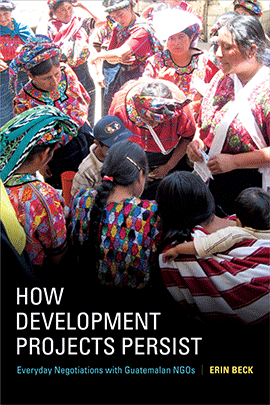 How Development Projects Persist: Everyday Negotiations with Guatemalan NGOs
How Development Projects Persist: Everyday Negotiations with Guatemalan NGOs
by Erin Beck. Duke University Press (May 2017)
Erin Beck is an assistant professor of political science at the University of Oregon and a member of the CLLAS Executive Board.
“In How Development Projects Persist Erin Beck examines microfinance NGOs working in Guatemala and problematizes the accepted wisdom of how NGOs function. Drawing on twenty months of ethnographic fieldwork, she shows how development models and plans become entangled in the relationships among local actors in ways that alter what they are, how they are valued, and the conditions of their persistence.
“Beck focuses on two NGOs that use drastically different methods in working with poor rural women in Guatemala. She highlights how each program’s beneficiaries—diverse groups of savvy women—exercise their agency by creatively appropriating, resisting, and reinterpreting the lessons of the NGOs to match their personal needs. Beck uses this dynamic—in which the goals of the developers and women do not often overlap—to theorize development projects as social interactions in which policymakers, workers, and beneficiaries critically shape what happens on the ground.
“This book displaces the notion that development projects are top-down northern interventions into a passive global south by offering a provocative account of how local conditions, ongoing interactions, and even fundamental tensions inherent in development work allow such projects to persist, but in new and unexpected ways.”
